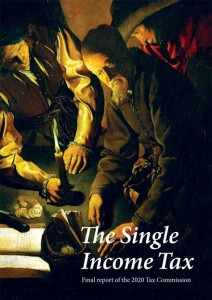 This week, the 2020 Tax Commission published its final report (PDF). Yesterday, Eamonn Butler wrote Don’t ignore the powerful moral arguments against high taxation. I recommend the whole article, but this section is particularly compelling:
This week, the 2020 Tax Commission published its final report (PDF). Yesterday, Eamonn Butler wrote Don’t ignore the powerful moral arguments against high taxation. I recommend the whole article, but this section is particularly compelling:
Tax reduces people’s ability to act morally. They might prefer to spend their money on helping their children become good citizens, caring for their elderly relatives, or supporting good causes. Instead they see it taken and going on bank bailouts or expensive prestige projects. Though we wish to see individuals, families and local groups taking more responsibility for their own lives and welfare, high taxes leave them less able to do so.
And when the authorities usurp our choices, we cease to be morally sovereign and responsible individuals, and become mere agents of the state. A society cannot be considered “generous” or “caring” when its care and generosity is funded on money forced out of people, rather than freely given. Giving that comes voluntarily, through the public spirit of private donors, is far more laudable morally than support that is extracted by coercion.
After inheriting an infamously long and complex tax code, the Chancellor wisely set up the Office of Tax Simplification. It has not yet produced recommendations to inspire. That’s why today I asked the Leader of the House in Business Questions for a debate on tax simplification, the 2020 Tax Commission Report and the performance of the Office of Tax Simplification.
No doubt Labour and indeed previous governments meant well when they constructed our giant and labrinthine tax system, but it is time for a meaningful and thoughtful conversation about taxation and the direction of our society.
Morally Sovereign, I like that you used those terms. Morality, by definition, must come from Free Will as Adam Smith and many others have proven. If the avoidance of infringing upon the Rights of others does not come from one’s own decision, then it is not Morality, it is either coercion or restraint. I’m not surprised that The Adam Smith Institute provided a link to this proposal for debate.
Something quite profound I learned recently is that the Pursuit of Happiness that Jefferson included as a Right in the Declaration of Independence is that that the Pursuit of Happiness can be defined.
The PoH is the Free Will to derive Happiness from both Self Interest and Altruism and acting upon it. Happiness, as defined by Smith, Hume, and Hutcheson is the joy that comes from self interested and altruistic acts.
If one is forced into self interest or altruism, it cannot be said to be self interest or altruism because Free Will is not present.
In any event, I am so pleased that this debate is being proposed. My gut feeling is that the opposition will avoid the debate similar to the Global Warmists, but the world is taking notice that it is NOT the Micro Economists that are avoiding the debate, it is the Macro (central planning) economists with regularity.
“it is time for a meaningful and thoughtful conversation about taxation and the direction of our society”
It certainly is. And it is also time to recognise that the most important requirement of a tax system, and indeed government policy as a whole, is that it should be *fair*.
The Office of Tax Simplification is a failing istitution and if it does not come up with some sensible proposals soon its members should be fired. Take for example, the IR35 regulations which cause uncertainty and unfairness in the tax system. Both the Conservatives and Liberal Democrats promised to abolish it, so what is the problem in keeping that promise? HMRC don’t like it. We have capture by the state establishment of a body set up to make tax simpler.